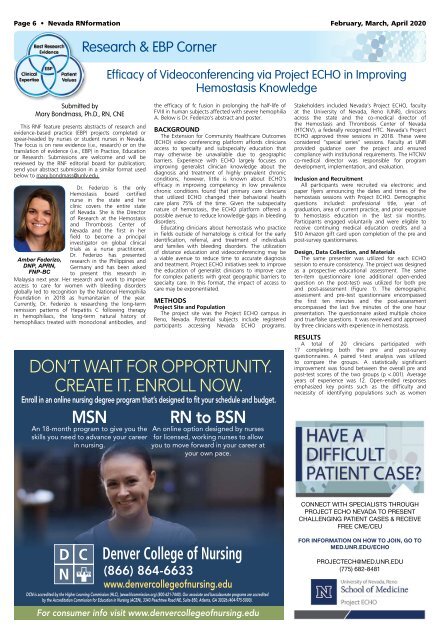Nevada RN - February 2020
- No tags were found...
You also want an ePaper? Increase the reach of your titles
YUMPU automatically turns print PDFs into web optimized ePapers that Google loves.
Page 6 • <strong>Nevada</strong> <strong>RN</strong>formation <strong>February</strong>, March, April <strong>2020</strong><br />
Research & EBP Corner<br />
Efficacy of Videoconferencing via Project ECHO in Improving<br />
Hemostasis Knowledge<br />
Submitted by<br />
Mary Bondmass, Ph.D., <strong>RN</strong>, CNE<br />
This <strong>RN</strong>F feature presents abstracts of research and<br />
evidence-based practice (EBP) projects completed or<br />
spear-headed by nurses or student nurses in <strong>Nevada</strong>.<br />
The focus is on new evidence (i.e., research) or on the<br />
translation of evidence (i.e., EBP) in Practice, Education<br />
or Research. Submissions are welcome and will be<br />
reviewed by the <strong>RN</strong>F editorial board for publication;<br />
send your abstract submission in a similar format used<br />
below to mary.bondmass@unlv.edu.<br />
Amber Federizo,<br />
DNP, AP<strong>RN</strong>,<br />
Dr. Federizo is the only<br />
Hemostasis board certified<br />
nurse in the state and her<br />
clinic covers the entire state<br />
of <strong>Nevada</strong>. She is the Director<br />
of Research at the Hemostasis<br />
and Thrombosis Center of<br />
<strong>Nevada</strong> and the first in her<br />
field to become a principal<br />
investigator on global clinical<br />
trials as a nurse practitioner.<br />
Dr. Federizo has presented<br />
research in the Philippines and<br />
Germany and has been asked<br />
to present this research in<br />
FNP-BC<br />
Malaysia next year. Her research and work to improve<br />
access to care for women with bleeding disorders<br />
globally led to recognition by the National Hemophilia<br />
Foundation in 2018 as humanitarian of the year.<br />
Currently, Dr. Federizo is researching the long-term<br />
remission patterns of Hepatitis C following therapy<br />
in hemophiliacs, the long-term natural history of<br />
hemophiliacs treated with monoclonal antibodies, and<br />
the efficacy of fc fusion in prolonging the half-life of<br />
FVIII in human subjects affected with severe hemophilia<br />
A. Below is Dr. Federizo’s abstract and poster.<br />
BACKGROUND<br />
The Extension for Community Healthcare Outcomes<br />
(ECHO) video conferencing platform affords clinicians<br />
access to specialty and subspecialty education that<br />
may otherwise be unavailable due to geographic<br />
barriers. Experience with ECHO largely focuses on<br />
improving generalist clinician knowledge about the<br />
diagnosis and treatment of highly prevalent chronic<br />
conditions, however, little is known about ECHO’s<br />
efficacy in improving competency in low prevalence<br />
chronic conditions found that primary care clinicians<br />
that utilized ECHO changed their behavioral health<br />
care plans 75% of the time. Given the subspecialty<br />
nature of hemostasis, the ECHO platform offered a<br />
possible avenue to reduce knowledge gaps in bleeding<br />
disorders.<br />
Educating clinicians about hemostasis who practice<br />
in fields outside of hematology is critical for the early<br />
identification, referral, and treatment of individuals<br />
and families with bleeding disorders. The utilization<br />
of distance education and videoconferencing may be<br />
a viable avenue to reduce time to accurate diagnosis<br />
and treatment. Project ECHO initiatives seek to improve<br />
the education of generalist clinicians to improve care<br />
for complex patients with great geographic barriers to<br />
specialty care. In this format, the impact of access to<br />
care may be exponentiated.<br />
METHODS<br />
Project Site and Population<br />
The project site was the Project ECHO campus in<br />
Reno, <strong>Nevada</strong>. Potential subjects include registered<br />
participants accessing <strong>Nevada</strong> ECHO programs.<br />
Stakeholders included <strong>Nevada</strong>’s Project ECHO, faculty<br />
at the University of <strong>Nevada</strong>, Reno (UNR), clinicians<br />
across the state and the co-medical director of<br />
the Hemostasis and Thrombosis Center of <strong>Nevada</strong><br />
(HTCNV), a federally recognized HTC. <strong>Nevada</strong>’s Project<br />
ECHO approved three sessions in 2018. These were<br />
considered “special series” sessions. Faculty at UNR<br />
provided guidance over the project and ensured<br />
compliance with institutional requirements. The HTCNV<br />
co-medical director was responsible for program<br />
development, implementation, and evaluation.<br />
Inclusion and Recruitment<br />
All participants were recruited via electronic and<br />
paper flyers announcing the dates and times of the<br />
hemostasis sessions with Project ECHO. Demographic<br />
questions included: professional title, year of<br />
graduation, area of current practice, and prior exposure<br />
to hemostasis education in the last six months.<br />
Participants engaged voluntarily and were eligible to<br />
receive continuing medical education credits and a<br />
$10 Amazon gift card upon completion of the pre and<br />
post-survey questionnaires.<br />
Design, Data Collection, and Materials<br />
The same presenter was utilized for each ECHO<br />
session to ensure consistency. The project was designed<br />
as a prospective educational assessment. The same<br />
ten-item questionnaire (one additional open-ended<br />
question on the post-test) was utilized for both pre<br />
and post-assessment (Figure 1). The demographic<br />
assessment and pre-test questionnaire encompassed<br />
the first ten minutes and the post-assessment<br />
encompassed the last five minutes of the one hour<br />
presentation. The questionnaire asked multiple choice<br />
and true/false questions. It was reviewed and approved<br />
by three clinicians with experience in hemostasis.<br />
RESULTS<br />
A total of 20 clinicians participated with<br />
17 completing both the pre and post-survey<br />
questionnaires. A paired t-test analysis was utilized<br />
to compare the groups. A statistically significant<br />
improvement was found between the overall pre and<br />
post-test scores of the two groups (p

















